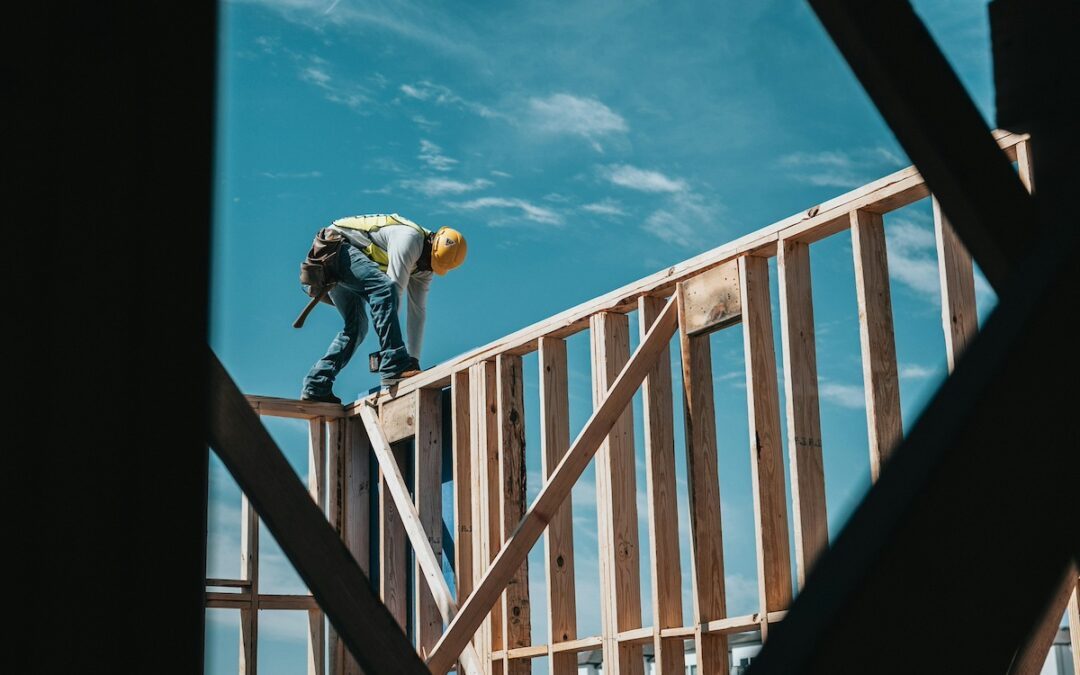
US Sen. Ruben Gallego, D-Ariz., speaks at the Senate Homeland Security and Governmental Affairs Committee confirmation hearing for South Dakota Gov. Kristi Noem, President-elect Donald Trump's nominee to be Secretary of Homeland Security, at the Capitol in Washington, Jan. 17, 2025. (AP Photo/Ben Curtis)
US Sen. Ruben Gallego shares what he’s doing to improve access to affordable housing in Arizona and the rest of the US.
This story first appeared in Rent Check PHX, a biweekly newsletter made for Phoenix renters, written by someone who’s lived it. Sign up for it here.
At 45 years old, Ruben Gallego is one of the youngest members of the US Senate.
The median age of a US senator is 65—meaning there’s a generational gap between the Arizona Democrat, who is on the cusp of Gen X and millennial, and the Boomers who make up the majority of the Senate.
When I spoke with Gallego at The Copper Courier’s downtown Phoenix coworking space last week, he cited his age as a reason he cares about legislation aimed at making housing more affordable.
Even though buying a home in Phoenix wasn’t out of reach in his 20s—we talk about his first homebuying experience below—he says he’s more in touch with issues facing young people, with housing costs being one of the most pressing.
I told him about the summer I spent looking at homes in Phoenix and the painful reality check I got after touring the low-quality houses in my budget. He recognized that this was part of a systemic problem, not just my inability as a millennial to cut back on avocado toast.
He also recognizes that he has a responsibility as a member of Congress to do something about it. We talked about what he’s doing to move the needle on the affordable housing crisis—including the ROAD to Housing Act—and how he’s pushing back against algorithms that keep rent artificially high.
Note: This interview has been edited for length and clarity.
Jessica Swarner (JS): I wanted to ask about the federal legislation that you’re working on and the Road to Housing package. Can you talk about and explain how that could help make housing affordable, not just in the US, but in Arizona, too?
Sen. Ruben Gallego (RG): So it’s a pretty massive bill that Democrats and Republicans worked on. We got it out of the Senate, and we hope to be able to get it through [the House] pretty soon. It covers a lot of things, but the most important thing is to just try to do everything we can to put more supply of housing onto the market.
In terms of renting, I went and changed one of the dumb regulations that said if you wanted to borrow money from the federal government, you could only borrow so much money if you’re building apartments. What does that matter? People want to build apartments. If you hit a certain amount of money, the federal government won’t guarantee that loan, which means then you have to go try to get a private loan, then nobody wants to give that.
The way that we could get rent lower the fastest is by putting as much on the market as possible on the housing side. I also worked with a Republican to make it easier for you to use a federal-backed loan for you to use manufactured housing [homes built in a factory then transported to a site]. Not everyone’s going to have a starter home. Not everyone’s going to live in an apartment. Manufactured housing is a way to get really cheap but quality housing. It’s not like the trailer parks that we all grew up with and certainly ones that I used to visit growing up. These are quality homes that people can actually use.
We’re just looking for any way to cut regulations that are making it harder to build.
JS: I know that a lot of these bills have to do with increasing the housing supply, and people might not totally understand how that translates to cheaper rent or more affordable homes. Can you thread that needle?
RG: Well, it’s just like supply and demand. There’s too much demand, not enough supply. The landlords will raise the rents. What we’ve seen in states and cities that have been able to build more, rents have started going down.
For example, if you look at Austin, rents are going down. If you look at cities that have also loosened their regulations on zoning for multi-family, for apartments, for higher density, you’ve seen rents are going down. Arizona is finally turning the corner on the regulation side, but you still need to have the building side.
Now we’re seeing some of that happening, and I think there’s going to be a lot more apartments on the market, which will basically help start bringing the costs down. But then we also have to work on the other side of this, which is the regulation side of it, because a lot of these landlords will try to use different methods to keep their prices artificially high, such as RealPage. But that’s an area that I work on with our law enforcement arm. But in the meantime, supply is the best answer to it.
JS: I noticed a lot of the bills in the package have to do with buying homes and homeownership. Is there anything specific to renting and renters?
RG: In terms of specific to renters? No. To development of rental properties? Yes. And that’s largely because you could only get so many votes from Republicans.
I do have other bills that I’m working on, too. For example, Arizona is not given as many Section 8 vouchers for our population compared to other states, even though other states are smaller than ours, right? That’s just because they’re using a formula from the 1990 population estimate. Obviously we’ve grown a lot since 1990.
I’m working on a housing package that would help people deduct for rent. You can deduct your mortgage interest, but you can’t deduct rent. And I think that’s not really helpful to young people because most young people are now renting instead of owning.
So there’s a bunch of other things that I’m working on, but this bill doesn’t really focus on the renter itself, but just the overall rental market.
JS: Could you talk about your involvement with the RealPage stuff? That’s been a really big deal here, and our previous coworker Camaron reported on it a lot. It’s something I know our audience is really interested in.
RG: It just shocked me when I heard about it, and that’s why I got involved as much as possible.
For those that don’t know, RealPage was essentially a collusion of all the landlords so that way they could keep rents artificially high so they weren’t responding to market demand. This RealPage group would basically coordinate for landlords. So for example, tell a landlord, “Hey, don’t rent out your property. Wait a couple more months and then you’ll end up making more money because then we’re keeping the supply artificially high.” That is absolute collusion.
We would never accept, for example, McDonald’s, Burger King, and Subway colluding to keep prices artificially high for them to take advantage of the consumer. Their claim is, well, it’s not people talking to each other, it’s an algorithm that works together. It doesn’t make a difference. It’s still powerful landlords that are colluding against renters, and so I’ve been a big advocate for stopping it, including legislation, including talking to people that have enforcement power on it. And we need to make sure we keep an eye on it because just because this is done in a high-tech way, done in San Francisco with a bunch of tech bros, doesn’t make it an excuse.
It’s still collusion. It’s still just as bad as what the robber barons were doing years ago.
JS: Do you have any certain goals for your term related to housing?
RG: Yes. No. 1, to bring down the cost. It’s just ridiculously high for Arizona.
When I got back from Iraq at the age of 26, I bought my first home, a condo in downtown Phoenix for $190,000. It’s near impossible for someone to do that now. It’s impossible even. And even if they’re making good wages, in order for them to even buy a home, they have to drive out into the middle of nowhere, and good luck with the interest rates that are in right now.
So I want to make things cheaper for Arizonans—that means buying a home or renting, right? Because that is the basic of whether you get to live a good life, if your housing is affordable and safe. And that’s just not the case right now.
I just introduced a bill a couple of days ago for people to be able to use their IRA for down payment assistance. There’s a lot of young men and women that are working in companies that give them an IRA. What good is an IRA if you’re not going to be able to tap into it until the age of 67, whether you want to be able to buy a house or put a down payment on a house? So this allows you to tap $50,000 worth of IRA tax-free.
For me, growing up, I didn’t grow up rich, but I grew up in very stable housing. The same apartment I lived in from junior high all the way to when I graduated from high school. It was shitty, I slept on the floor, but I knew my neighbors. I knew the school district. My mom knew everybody. And at least we had stable housing.
There’s a lot of people now that are going year to year trying to basically hunt for the cheaper rent because rent keeps going up, and that’s just very destabilizing to our families here.
JS: I’m glad you brought up the condo because I was going to ask about what your first homebuying experience was like. I spent two summers ago trying to buy a house and the things in my budget had holes in the walls. It was a crazy experience. Did you ask yourself “Am I going to be able to buy a house?” Or at that time, was it not a question?
RG: It was 2006, and it was a condo. I had the expectation that I would always be able to buy a home. I think people my age—I’m 45—when we were growing up, we always understood if you had a good job and you had good credit, you were going to be able to buy a home. Now the question is, what kind of home would it be? Would it be a small home? But we always assumed you would actually be able to get a starter home. It was never a doubt in my mind.
[Young people] think that that idea is just so out of reach and it is financially out of reach right now, and I think government has not been helpful in trying to change that. And some of it is on the regulation side.
When I first started, you could buy a home pretty cheaply for $200,000 in Arizona, but now your average home’s around $500,000. Three-and-a-half percent down is expensive, right? Let alone people aren’t making as much; your wages aren’t going up as high. So it’s really unfair what people are dealing with right now.
MORE: Time to move? Here’s how to find your next rental in Phoenix
Support Our Cause
Thank you for taking the time to read our work. Before you go, we hope you'll consider supporting our values-driven journalism, which has always strived to make clear what's really at stake for Arizonans and our future.
Since day one, our goal here at The Copper Courier has always been to empower people across the state with fact-based news and information. We believe that when people are armed with knowledge about what's happening in their local, state, and federal governments—including who is working on their behalf and who is actively trying to block efforts aimed at improving the daily lives of Arizona families—they will be inspired to become civically engaged.


This Arizona ZIP code ranked as 6th most popular place to move in 2025. Here’s why
The metro Phoenix area is home to one of the hottest ZIP codes to move to in the country, according to a new report. And they're not talking about...

How does your rent in Phoenix compare to surrounding cities?
Here’s a reality check on Phoenix-area rent, from Fountain Hills to Glendale. The findings might surprise you. This story first appeared in Rent...

11 Arizona-made products to spruce up your apartment
Arizona-made products have impeccable craftsmanship and can level up any space. Check out these 11 options, from bar cart staples to stunning art....

1916 school building gets new life as affordable housing in Miami, Arizona
With recent housing developments in Globe seeing success, the neighboring town of Miami, Arizona, has followed suit. Here’s what to know about the...





